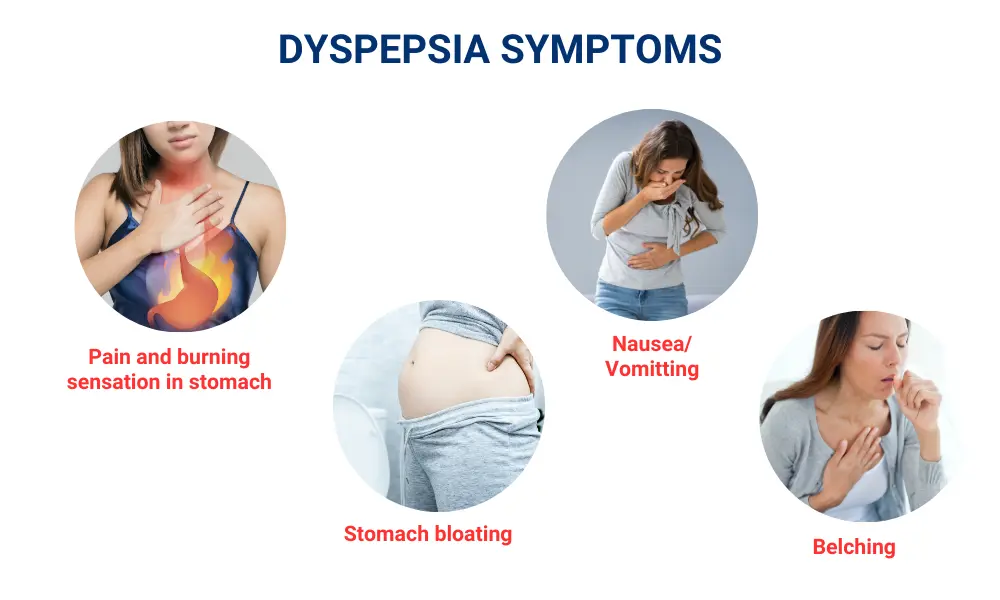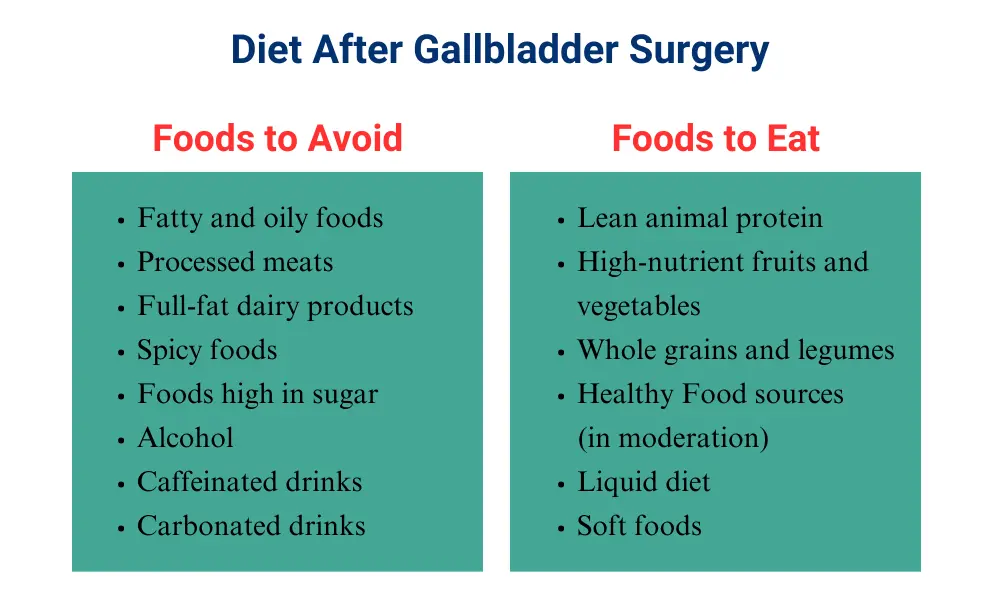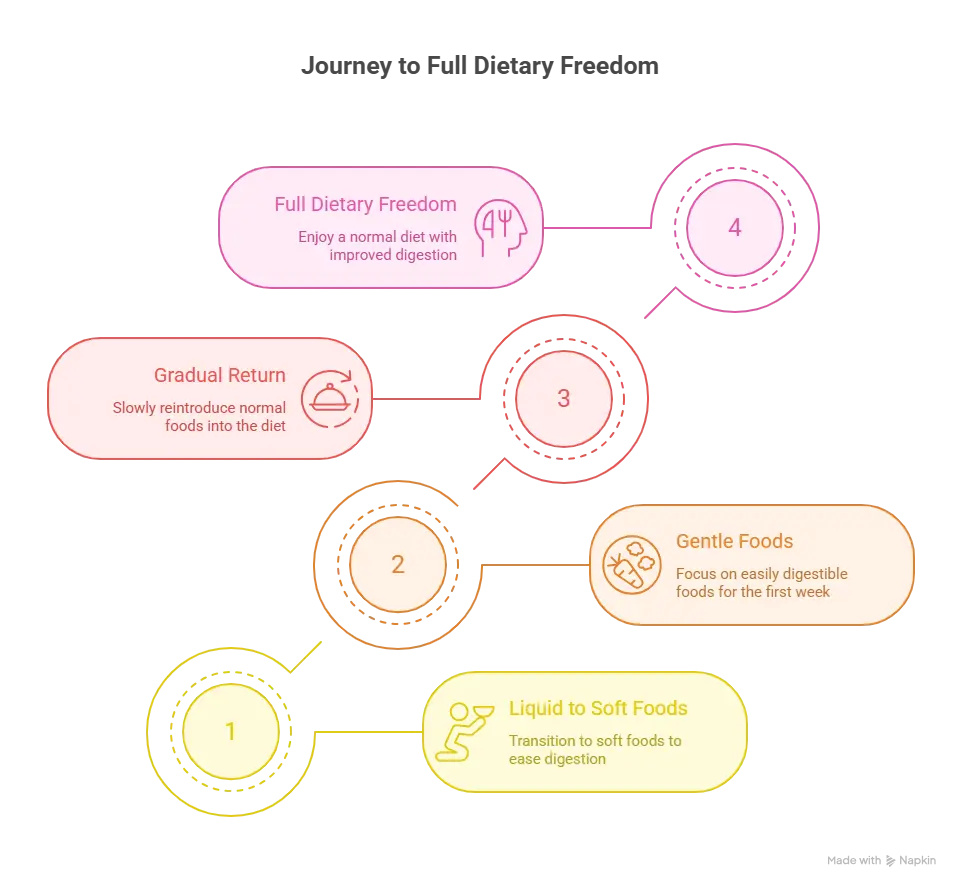Time Period | WHAT TO EAT | WHAT TO AVOID |
Day 1 | – Clear vegetable broths (bottle gourd, ridge gourd) – Dal water (moong dal – strained) – Fresh lime water with rock salt – Warm water | – All solid foods – Cold beverages |
Day 2 | – Soft khichdi (rice + moong dal) – Light moong dal (well-cooked) – Well-cooked rice with modest ghee | – Spicy preparations |
First Week (Days 1-7) | Recommended: – Soft khichdi – Well-cooked moong dal, masoor dal, chana dal – Soft rice with ghee – Fresh salads (cucumber, tomato, carrot) – Light lemon juice dressing – Rock salt (small amounts) – Light non-vegetarian soups (if preferred) – Fresh curd (if well-tolerated) – Soft paneer (minimal oil) Mild Spices Allowed: – Turmeric – Small amount of cumin powder – Fresh ginger paste – Coriander leaves | Strictly Avoid: – Spicy foods – Salty preparations – Fried items – Non-vegetarian solid foods – Heavy spices – Cold foods – Processed foods – Carbonated drinks – Alcohol – High-fat foods |
After First Week | Gradual Introduction: – Regular family foods (as tolerated) – Normal protein sources – Traditional Indian meals – Return to normal dietary preferences | Temporary Caution: – Very heavy or greasy foods initially – Excessive spices until fully healed – Large meal portions (eat smaller, frequent meals) |
Long-term (Post-Recovery) | Complete Freedom: – All foods according to family traditions – Regular meal patterns – Foods that previously caused problems – Festival and celebration meals – No specific dietary restrictions | No Long-term Restrictions: – There are no permanent dietary limits |
Namaste. I am Dr. Kedar Patil, a Robotic Bariatric and Advanced Laparoscopic Surgeon practising at Presize Clinic in Pune. Over my years of experience in performing gallbladder surgeries for families across Maharashtra, I have had the privilege of guiding countless households through the recovery process.
Today, I want to address one of the most sincere concerns that patients and their families express during consultations: “Doctor, what should our family member eat after gallbladder surgery, and how can we ensure the best possible recovery?”
I understand that this question reflects the deep care and responsibility that Indian families feel toward their loved ones’ health. When a family member undergoes surgery, it becomes a collective concern that involves parents, spouses, children, and often extended family members who all want to contribute to the healing process.
This investment in family well-being is something I witness daily in my practice, and it is this collaborative approach that often leads to the most successful recovery outcomes.
Allow me to explain what happens in your body that will bring considerable relief to you and your family. Many patients who come to my clinic have been suffering from gallbladder stones for months or even years, experiencing symptoms that significantly impact their daily life and family interactions.

The most common complaint I address in my consultations is dyspepsia, which manifests as:
What I want to emphasise to every family is that gallbladder surgery provides a remarkable solution to these problems. The eating experience improves dramatically for most patients after the procedure.
Those uncomfortable symptoms that have been troubling your household – bloating, indigestion, and a fear of fatty foods – typically resolve completely, allowing your family member to return to enjoying meals with confidence and comfort.
The first two days after surgery establish the foundation for your successful recovery, and I have developed this approach based on years of treating families from diverse backgrounds across Pune and the surrounding areas.
On the first day following surgery, I recommend that patients focus entirely on liquid nutrition, which allows the digestive system to rest while providing essential hydration and basic nutrients. This approach has proven successful across thousands of cases in my practice.
Your family can prepare clear vegetable broths by boiling common Indian vegetables, such as bottle gourd or ridge gourd, and using the strained liquid for nutrition.
Dal water, particularly from moong dal that has been cooked thoroughly and strained, provides protein in an easily digestible form.
Fresh lime water with a small amount of rock salt helps maintain proper electrolyte balance, while warm water itself becomes medicine for your healing body.
The second day represents a significant milestone where we gradually introduce semi-solid and soft foods that begin to restore normal eating patterns while remaining gentle on your recovering system.
Soft khichdi becomes your primary solid food – this traditional Indian comfort food, prepared by cooking rice and moong dal together until completely soft, provides balanced nutrition with minimal digestive effort.
The addition of a small amount of pure ghee and a pinch of turmeric not only enhances taste but also provides healing properties that our traditional knowledge has recognised for generations.
Light dal preparations, particularly those made with moong dal cooked until very soft, provide essential protein for tissue repair. Well-cooked rice, accompanied by a modest amount of ghee, provides energy and comfort during this crucial recovery period.
The first seven days after surgery represent a critical period, during which following specific dietary guidelines ensures optimal healing and prevents complications that could delay your return to normal activities.

During this week, I advise families to temporarily avoid spicy foods, salty preparations, and fried items. This recommendation serves a specific medical purpose – these foods can irritate the digestive system during the sensitive healing period and may cause discomfort that interferes with recovery.
When I say avoid spicy foods, I understand this may concern families who worry about preparing bland meals. You can still create flavorful dishes using mild spices such as turmeric, a small amount of cumin powder, fresh ginger paste, and coriander leaves, which provide taste without causing digestive stress.
For families who regularly consume non-vegetarian foods, I recommend avoiding these items for the first seven days to prevent constipation, which can cause discomfort during the healing period.
However, if your family prefers non-vegetarian nutrition, light non-vegetarian soups that are not heavily spiced can be included without concern.
This temporary adjustment should not worry non-vegetarian families – it is simply a precautionary measure during the initial healing phase, and normal dietary preferences can resume as recovery progresses.
I want to emphasise the significant role that fresh salads play in your post-surgery nutrition plan. Salads serve dual purposes that make them invaluable during recovery: they provide essential vitamins and minerals while helping prevent constipation, which is a common concern during the post-operative period.
Simple salads prepared with cucumber, tomato, and carrot offer refreshing nutrition that supports healing. These can be dressed lightly with lemon juice and a small amount of rock salt. The fibre content in these fresh vegetables promotes healthy bowel movements, which contributes to overall comfort during recovery.
The regular inclusion of salads in your daily meals also helps establish healthy eating patterns that benefit your long-term digestive health and overall well-being.
High-protein foods play a crucial role in supporting your body’s natural healing mechanisms, and I always advise families on the importance of including adequate protein in their diet after gallbladder surgery.
The external wounds from laparoscopic surgery typically heal within seven to ten days, and protein supports this healing process effectively. Traditional Indian protein sources, such as well-cooked moong dal, masoor dal, and chana dal, provide excellent nutrition while being gentle on the digestive system.
For families who include dairy in their diet, soft paneer prepared with minimal oil provides a high-quality protein source. Fresh curd, when well-tolerated, provides both protein and beneficial bacteria that support digestive health. These protein choices align perfectly with Indian dietary traditions while meeting your nutritional needs.

This is the most encouraging message I can share with every family: there are no specific long-term dietary restrictions after gallbladder surgery. Once your healing is complete, you can return to eating regular food according to your family’s preferences and traditions.
Most patients are amazed by the improvement they experience in their ability to digest and enjoy food after surgery. The foods that previously caused discomfort, bloating, and anxiety can typically be consumed without any problems once healing is complete. This transformation often exceeds patients’ expectations and brings joy back to family meal times.
I have witnessed families rediscovering the pleasure of cooking and eating together, no longer constrained by the fear of triggering digestive symptoms. Festival meals, family celebrations, and even everyday dining become sources of happiness rather than concern.
I recognise that each family approaches recovery with unique concerns based on their circumstances, dietary traditions, and the patient’s individual health profile. Some families worry about whether their traditional cooking methods will suit the post-surgery requirements, while others are concerned about balancing nutritional needs with the patient’s preferences.
These concerns reflect the thoughtful, caring approach that Indian families take toward health and recovery. The guidelines I have shared accommodate the diversity of Indian dietary practices while ensuring optimal healing outcomes.
When families view the temporary dietary adjustments as an investment in their loved one’s long-term health and comfort, the recovery period becomes more manageable and purposeful. These few weeks of careful attention to nutrition lay the foundation for years of improved digestive comfort and family meal enjoyment.
The dietary modifications during recovery are not restrictions but rather supportive measures that help your family member return to full health more quickly and comfortably. This perspective transforms the recovery period from a challenging time into a meaningful investment in future well-being.
Based on my experience treating families from various backgrounds and dietary traditions, I want to emphasise that while these guidelines provide a comprehensive framework for diet after gallbladder surgery, individual recovery experiences may vary based on personal health factors and family circumstances.
I always encourage patients and their families to maintain open communication with our medical team throughout the recovery process. Your comfort, confidence, and successful healing remain my top priorities, and I am available to address any specific questions or concerns that may arise during your journey.
Undergoing gallbladder surgery represents a significant step toward better digestive health and improved quality of life for your entire family. With proper attention to nutrition during the recovery period, adequate rest, and the loving support that Indian families naturally provide, you can anticipate returning to normal activities and enjoying meals without the discomfort that previously troubled your household.
The temporary dietary adjustments we have discussed serve a specific purpose in supporting your healing process. Trust in your body’s natural ability to heal, follow the guidelines we have outlined, and look forward to the significant improvement in eating comfort that awaits you.
For any specific concerns about your recovery journey or questions about your individual dietary needs following gallbladder surgery, please do not hesitate to contact us at Presize Clinic. Your health and comfort, along with your family’s peace of mind, remain our highest priorities throughout this healing process.